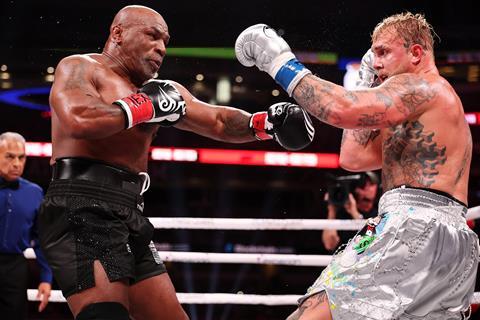Netflix VP of nonfiction series and sports Brandon Riegg has opened up on the streaming giant’s sports strategy

After years of speculation, Netflix has begun to make moves into the sport world, showing the recent Paul v Tyson and Taylor v Serrano boxing card, Christmas Day NFL games, and gaining the US rights to the next two Women’s World Cups.
This has seen some great successes as well as teething problems, summed up by the technical issues experienced by some Paul v Tyson viewers - which were caused because the event drew over 65 million concurrent viewers on the platform.
Speaking to The Athletic, Netflix’s VP of nonfiction series and sports, Brandon Riegg, explained that the streaming giant hasn’t been put off by these experiences, “What went wrong is also what went right. The sheer number of people that watched was beyond anything we could ever have predicted or imagined. That was great. What wasn’t great was that a certain percentage of them experienced technical issues.
“The good news is those are engineering or maths problems that can be solved. You have to stress-test the system sometimes — and we certainly got the stress-test of all stress-tests. And we have a great engineering team, they’ve already identified what we could have done differently and they’ve made adjustments. We feel totally confident and capable.”
However, Netflix does still have some reservations when it comes to sports rights, particularly about their long-term value. Riegg explained, “I think a lot of the challenges with sports leagues — or any external IP that we don’t own — is that if you’re a partner in helping grow it, at a certain point, at the end of its term, there’s always a risk someone else could come in and take on the deal. That’s unlike our scripted shows. For example, Black Doves will be on Netflix forever.
“With the NFL, what felt compelling to us is that it was a single day of games. It was a holiday. It felt like an event, a noticeable moment. It was a case of the NFL saying, ‘We’re going to make Christmas a thing. Would you like to do that with us?’. And we felt we could help. And that’s that’s a much more disciplined and focused approach than just saying, ‘We’re getting into sports’.”
Overall, the comapny is appears to be continuing with its opportunistic approach, perhaps targeting larger, less regular, events more than something like a football league. “As with everything, we remain sort of open-minded and opportunistic,” says Riegg. “We’re looking for events that have big viewership, are very buzzy and drive a lot of conversation.
“And we’re learning as we go. Between the fight, the NFL and having [WWE] Raw, we’ll certainly be testing the sports audience. In terms of more traditional sports, it will depend in terms of what opportunities come up.”







No comments yet